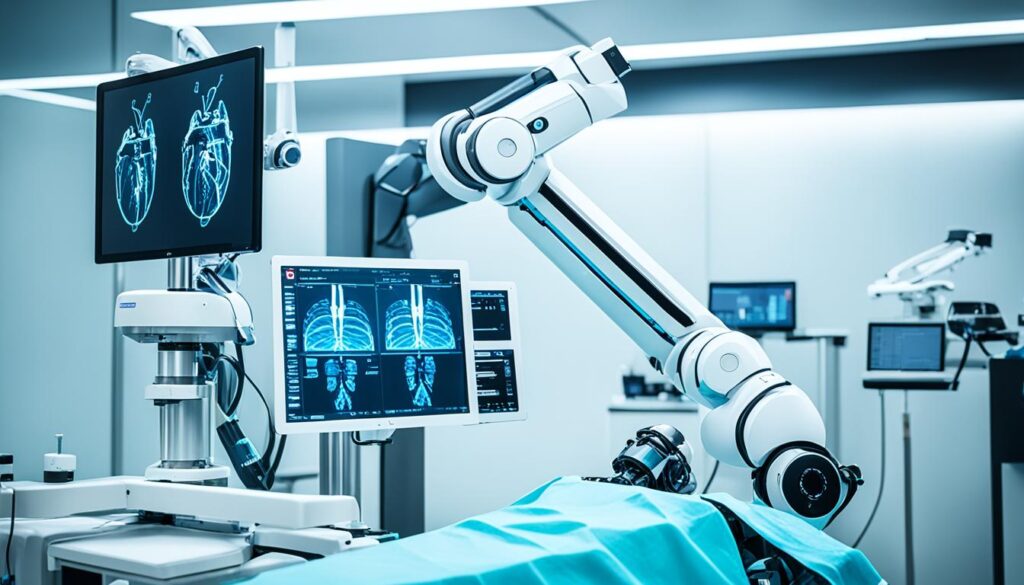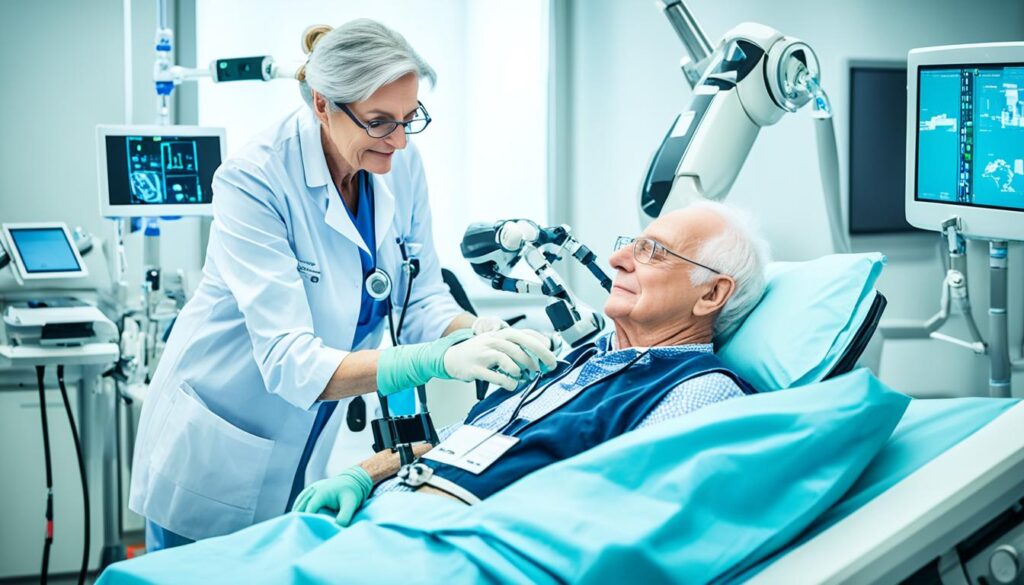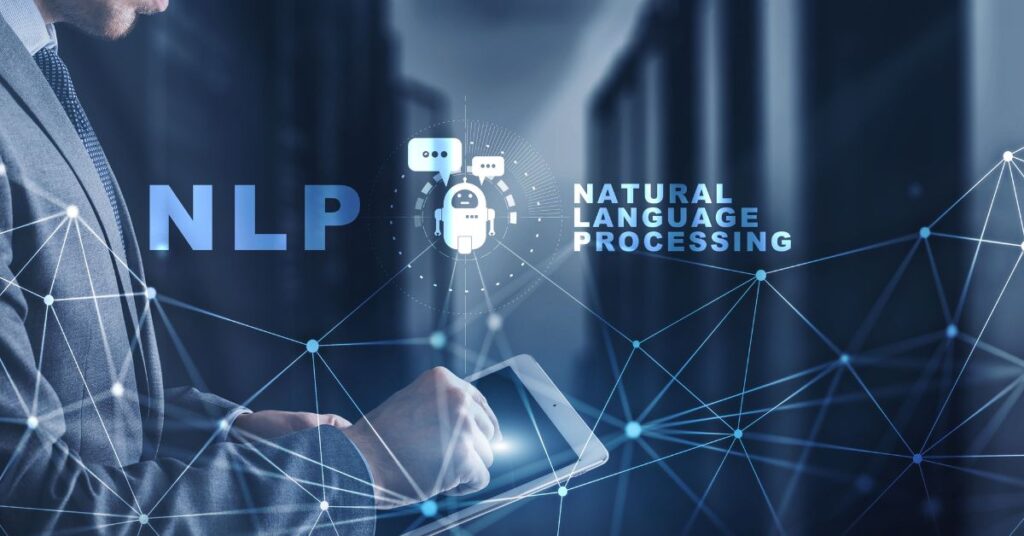Welcome to the future of healthcare, where cutting-edge technology is revolutionizing patient care and transforming the way healthcare professionals deliver treatments. In this rapidly evolving landscape, robotics and artificial intelligence (AI) are at the forefront, paving the way for innovative solutions that improve outcomes and enhance precision. From preventive healthcare to disease diagnosis and treatment, AI and robotics are reshaping the entire healthcare ecosystem.
At the intersection of healthcare and technology, robotics in healthcare with AI is making significant advancements. These technologies are being integrated into various aspects of healthcare, from consumer health applications to complex surgical procedures. By leveraging AI and robotics, healthcare providers can enhance patient care, streamline processes, and unlock new possibilities for medical treatments.

The potential of AI and robotics in healthcare is vast. AI, combined with the Internet of Medical Things (IoMT), is now being utilized in consumer health applications to help individuals proactively manage and monitor their health. These technologies enable accurate disease detection in the early stages, such as cancer, enabling timely intervention and improving patient outcomes.
Beyond consumer health applications, AI and robotics are transforming disease diagnosis and treatment. AI algorithms analyze medical images with remarkable accuracy, reducing unnecessary biopsies and offering more precise diagnoses. Robotic surgical systems assist surgeons in performing complex procedures with greater precision and minimally invasive techniques, leading to faster recovery times and reduced complications.
End-of-life care is also benefiting from the integration of AI and robotics. Robots can provide assistance in daily tasks, offer emotional support, and engage in social interactions, enhancing the quality of life for individuals with conditions like dementia. These technologies are revolutionizing the way we care for individuals at this stage and empowering them to maintain their independence for longer periods.
Furthermore, AI technology is revolutionizing drug discovery and development. Researchers can now leverage AI algorithms to expedite the identification and testing of potential drug candidates, leading to faster time to market and improved patient outcomes. Through the analysis of large datasets, AI can predict the efficacy and safety of new drugs, accelerating advancements in treatment options.
Moreover, AI and robotics are transforming medical training and education. Trainees can benefit from realistic simulations, personalized learning experiences, and continuous feedback. These technologies enable healthcare professionals to acquire and enhance their skills effectively and meet the evolving demands of patient care.
The future of healthcare is being shaped by the transformative power of robotics and AI. As these technologies continue to evolve, the potential for even greater advancements in patient care and outcomes is immense. Join us as we explore the remarkable applications of robotics in healthcare with AI and discover how they are revolutionizing the way we provide care.
AI and Robotics in Preventive Healthcare
AI and robotics are playing a transformative role in preventive healthcare, empowering you to proactively manage your health and well-being. By harnessing the power of AI technology in healthcare and the Internet of Medical Things (IoMT), innovative applications are encouraging healthier behaviors and enabling personalized support for a healthy lifestyle.
AI enables healthcare professionals to gain a deeper understanding of your unique needs, allowing them to provide tailored feedback and guidance in real-time. This personalized approach fosters a sense of empowerment, helping you stay motivated and committed to your health goals.
Additionally, AI is revolutionizing early disease detection, such as cancer, by analyzing medical images with unrivaled accuracy and speed. Through the integration of AI and wearable devices, the monitoring and detection of conditions like heart disease have reached new levels of precision.
With early-stage heart disease monitoring, timely intervention and effective management become possible, reducing the risk of complications and ensuring optimal care. By leveraging AI technology in healthcare, preventive measures can be taken to mitigate the development of chronic diseases before they progress.
AI and Robotics in Disease Diagnosis and Treatment
AI and robotics are revolutionizing disease diagnosis and treatment in the healthcare industry. By leveraging AI technology and robotics, healthcare professionals can improve accuracy, efficiency, and patient outcomes.
One major application of AI in disease diagnosis is the analysis of medical images, such as mammograms. Advanced AI algorithms can analyze these images with high accuracy and speed, reducing the need for unnecessary biopsies. This not only saves time and resources but also minimizes discomfort for patients.
In addition to medical imaging, AI is being used to analyze large amounts of patient data and medical research. This allows healthcare professionals to make more informed decisions and personalize treatment plans based on an individual’s specific needs.
Robotic surgical systems are another area where AI and robotics are making significant contributions to disease treatment. These systems can assist or even perform complex surgeries with greater precision and minimal invasiveness. As a result, patients experience faster recovery times and reduced complications.
The integration of AI technology and robotics in disease diagnosis and treatment holds immense potential for revolutionizing healthcare. By improving accuracy, efficiency, and patient outcomes, AI and robotics are transforming the way diseases are diagnosed and treated.
AI and Robotics in End-of-Life Care
AI and robotics have the potential to revolutionize end-of-life care, shaping the future of healthcare. These technological advancements offer numerous benefits, including enhancing independence, reducing hospitalizations, and improving the overall quality of life for individuals with conditions like dementia.
Robots equipped with AI capabilities can assist with daily tasks, providing practical support and easing the burden on both patients and caregivers. Beyond physical assistance, robots can also offer emotional support, engaging in social interactions to combat feelings of loneliness and isolation.

AI technology, combined with humanoid design, enables robots to initiate and sustain conversations with individuals, helping to keep aging minds sharp and engaged. This integration of robotic automation and AI in end-of-life care empowers individuals to remain independent for longer periods, reducing the need for hospitalization and care homes.
By leveraging robotic automation and AI, the overall quality of care at this critical stage of life can be significantly improved, ensuring that individuals receive the support they need to maintain their dignity and well-being.
AI and Robotics in Drug Discovery and Development
AI is revolutionizing the field of drug discovery and development in healthcare, paving the way for faster and more efficient processes. By harnessing the power of AI technology, researchers can streamline the identification and testing of potential drug candidates, leading to shorter time to market and reduced costs.
AI algorithms play a crucial role in analyzing vast datasets to predict the efficacy and safety of new drug candidates. This enables researchers to prioritize the most promising molecules for further development, saving valuable time and resources. The integration of AI in drug discovery and development has the potential to accelerate the availability of innovative treatments and significantly improve patient outcomes.
To visualize the impact of AI in healthcare, the image below demonstrates the connection between AI technology and drug discovery.
The future of AI in healthcare holds immense potential for advancing drug discovery and development. The ability to expedite the process while maintaining high standards of safety and effectiveness is crucial in addressing the evolving healthcare needs of the population. With further advancements in AI technology, researchers can continue to redefine the boundaries of pharmaceutical innovation and improve patient care.
AI and Robotics in Medical Training and Education
AI and robotics are revolutionizing the field of medical training and education, offering innovative solutions to enhance learning experiences and improve patient care. With AI technology in healthcare advancing at a rapid pace, the future of AI in healthcare looks promising.
One of the key benefits of AI and robotics in medical training and education is the ability to provide realistic simulations that mimic real-life scenarios. Through the use of AI algorithms, medical trainees can now participate in naturalistic simulations that challenge them in ways that traditional training methods cannot. These simulations offer a safe environment for trainees to practice and develop their skills, ultimately leading to more effective and efficient learning.
Furthermore, AI-powered training programs have the capacity to personalize the learning experience based on the trainee’s responses. By analyzing trainees’ performance and adapting the level of difficulty accordingly, these programs ensure individualized instruction that meets the specific needs of each trainee. This personalized approach maximizes learning outcomes and enhances the skills and competencies of future healthcare professionals.
In addition to personalized learning, AI and robotics also enable remote and mobile training opportunities. Trainees can access AI-powered training modules anytime, anywhere, removing geographical barriers and providing flexibility in the learning process. This accessibility allows for continuous learning and skill development, regardless of physical location.
Overall, the integration of AI and robotics in medical training and education holds great potential for the future of healthcare. By providing realistic simulations, personalized learning experiences, and the flexibility of remote and mobile learning, AI and robotics are reshaping how healthcare professionals acquire and enhance their skills. As AI technology in healthcare continues to advance, we can expect further advancements in medical training and education, leading to improved patient care outcomes and a more proficient healthcare workforce.
Conclusion
The integration of AI and robotics in healthcare is transforming the landscape of patient care, paving the way for more precise and efficient medical treatments. By harnessing the power of artificial intelligence, healthcare providers can improve disease detection and diagnosis, enhance treatment planning, and revolutionize end-of-life care. Robotics, on the other hand, is assisting in surgeries, rehabilitation, and providing support for individuals with long-term conditions.
With AI technology, individuals can now proactively manage their health and well-being, with personalized feedback and support. AI algorithms are enabling more accurate and timely detection of diseases such as cancer, enabling early intervention and better management. Additionally, the use of AI and wearables allows for better monitoring and detection of conditions like heart disease, leading to improved outcomes and quality of life.
Moreover, AI and robotics are not only reshaping patient care but also impacting drug discovery and medical training. Researchers can expedite the identification and testing of potential drug candidates, leading to faster development and availability of life-saving treatments. In medical training, AI-powered simulations provide realistic scenarios and personalized learning experiences, enhancing the skills and competencies of healthcare professionals.
As the field of AI and robotics in healthcare continues to evolve, the potential for further advancements and improvements in patient outcomes is immense. The transformative power of robotics and AI is shaping the future of healthcare, ushering in a new era of precision medicine and personalized care.
FAQ
How is AI and robotics being integrated into healthcare?
AI and robotics are being used in various aspects of healthcare, including consumer health applications, disease detection and diagnosis, surgical procedures, end-of-life care, and medical training and education.
What are some examples of AI and robotics in preventive healthcare?
AI and the Internet of Medical Things (IoMT) are being used in consumer health applications to encourage healthier behaviors and proactive management of health. AI is also enabling early detection of diseases and the monitoring of conditions like heart disease through wearables.
How are AI and robotics transforming disease diagnosis and treatment?
AI algorithms are being used to analyze medical images with high accuracy, reducing the need for unnecessary biopsies. Robotic surgical systems are assisting or performing complex surgeries with precision and minimal invasiveness, leading to faster recovery times and better outcomes.
In what ways are AI and robotics enhancing end-of-life care?
Robots can assist individuals with daily tasks, provide emotional support, and engage in social interactions to combat loneliness. AI technology combined with humanoid design enables robots to have conversations and keep aging minds sharp, improving the quality of life for individuals with conditions like dementia.
How is AI contributing to drug discovery and development?
AI is expediting the identification and testing of potential drug candidates by analyzing large datasets. AI algorithms can predict the efficacy and safety of new drugs, allowing researchers to prioritize promising molecules for further development, thereby accelerating the availability of new treatments.
How are AI and robotics revolutionizing medical training and education?
AI algorithms create realistic simulations that challenge trainees, enabling more effective learning experiences. AI-powered training programs can personalize the learning journey and provide continuous feedback. Robotics also facilitates remote and mobile learning, making training accessible anytime and anywhere.
What is the potential of AI and robotics in healthcare?
The integration of AI and robotics has the potential to revolutionize patient care, enhance precision in diagnosis and treatment, and shape the future of medical treatments. The transformative power of robotics and AI is expected to lead to further improvements in patient outcomes and healthcare delivery.

